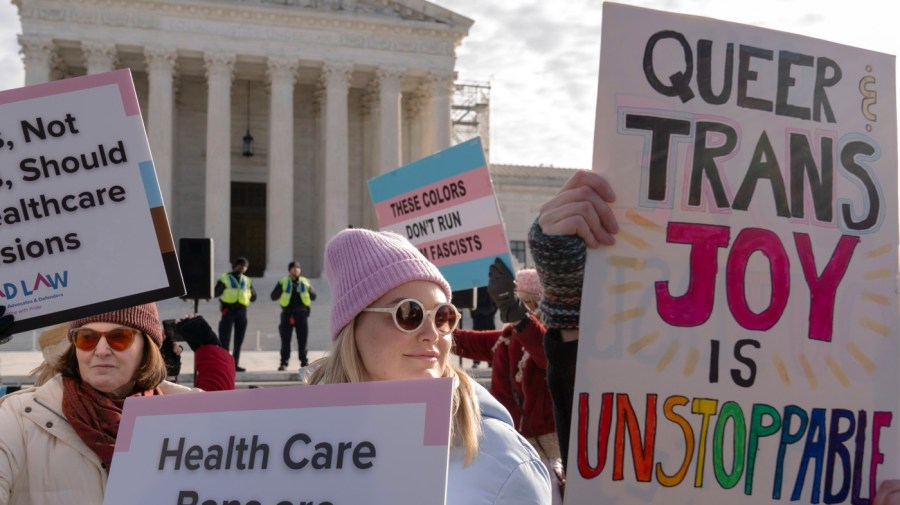
Cases implicating transgender rights are piling up at the Supreme Court as it begins drafting its opinion on whether states can ban gender-affirming care for minors.
The justices at their recent closed-door conferences have considered petitions to take up disputes involving what school sports teams transgender athletes can play on, parental rights and whether government-funded health care plans must cover transgender care.
Two justices appointed by President-elect Trump made a point to bring up those battles waiting in the wings during this month’s oral arguments in the blockbuster gender-affirming care case.
“If you prevail here on the standard of review, what would that mean for women’s and girls’ sports in particular?” Justice Brett Kavanaugh asked.
Kavanaugh kept returning to the question — that is, until Justice Amy Coney Barrett beat him to it by the time the last lawyer took the lectern.
“Could you address Justice Kavanaugh’s questions about what the implications of this case would be for the athletic context or the bathrooms context?” she pressed.
The lawyers insisted those cases were legally distinct.
“We would have no objection to explicit language saying this decision does not in any way or should not be understood to affect the separate state interests there that have to be evaluated on their own terms,” U.S. Solicitor General Elizabeth Prelogar said.
But the court appears to have concluded there is enough of an overlap that most of the petitions should be punted until the current dispute is resolved, which concerns whether Tennessee’s ban on gender-affirming care for minors amounts to unconstitutional sex discrimination. The decision, which is expected by summer, stands to impact similar laws passed in half the country.
Last month, the justices at two consecutive conferences mulled whether to take up appeals from Idaho and West Virginia defending their bans on transgender girls competing on women’s school sports teams.
The justices took no action and did not relist the petitions for discussion at any of their December conferences, court dockets show, effectively placing the cases in indefinite limbo. Though the court provided no explanation, that pattern typically occurs when the justices have decided to hold a petition pending the disposition of a current case.
The American Civil Liberties Union (ACLU) did not object to the move. The group represents both the transgender adolescents currently challenging Tennessee’s gender-affirming care ban at the Supreme Court as well as the students who sued over West Virginia’s and Idaho’s transgender athlete bans.
“There is no reason for a grant in this case to answer the same question,” the ACLU wrote in court filings.
Both West Virginia and Idaho unsuccessfully cautioned the Supreme Court against waiting.
“A hold would further delay resolution of these important issues—by at least a year, or, in the case of a subsequent remand, three years—subjecting female athletes to substantial ongoing harm,” the West Virginia attorney general’s office wrote in court filings.
Idaho’s attorney general’s office similarly wrote, “There is no better time than now to protect women and girls on the field of competition and in the locker room.”
A similar dynamic has played out in a battle over West Virginia’s and North Carolina’s refusal to cover certain care for transgender people with government-sponsored health insurance.
The states petitioned the justices to take up their appeal after losing before a lower court.
Two days after the gender-affirming care argument, the Supreme Court considered the petitions at its weekly conference on Dec. 6. The cases were then placed into limbo.
The justices are now on their holiday break and won’t return until January.
In the meantime, written briefing is continuing for other petitions implicating transgender protections. They, too, will soon be headed to the justices’ conferences to decide whether to take up the cases.
Challengers to Alabama’s ban on gender-affirming care filed a Supreme Court petition just before Thanksgiving.
In Arizona, state lawmakers have filed a petition seeking to revive their transgender athlete ban at the Supreme Court. The lawmakers are represented by D. John Sauer, who is President-elect Trump’s nominee to become U.S. solicitor general. Two transgender girls who are challenging the legislation are due to respond by Monday as to why the justices shouldn’t take the case.
Meanwhile, Alliance Defending Freedom, a conservative Christian legal powerhouse, is representing a professional counselor challenging Colorado’s ban on treatments that attempt to change an individual’s sexual orientation or gender identity. Twelve Republican-led states are backing the counselor’s Supreme Court appeal.
It remains unclear, however, whether the justices have an appetite to get involved in the hot-button cases.
Early this year, the court turned away an opportunity to take up whether schools can ban transgender students from using bathrooms consistent with their gender identity in a case arising from Indiana.
And this month, the justices declined to hear an appeal filed by a group of Wisconsin parents who sued their children’s school district over a policy meant to support transgender students. A lower court didn’t reach the merits of the parents’ claim after finding they didn’t have legal standing to proceed.
Three conservative justices — Samuel Alito, Clarence Thomas and Kavanaugh — said they would’ve heard the case. But four votes are required.
“I am concerned that some federal courts are succumbing to the temptation to use the doctrine of Article III standing as a way of avoiding some particularly contentious constitutional questions,” Alito wrote in his dissent.

